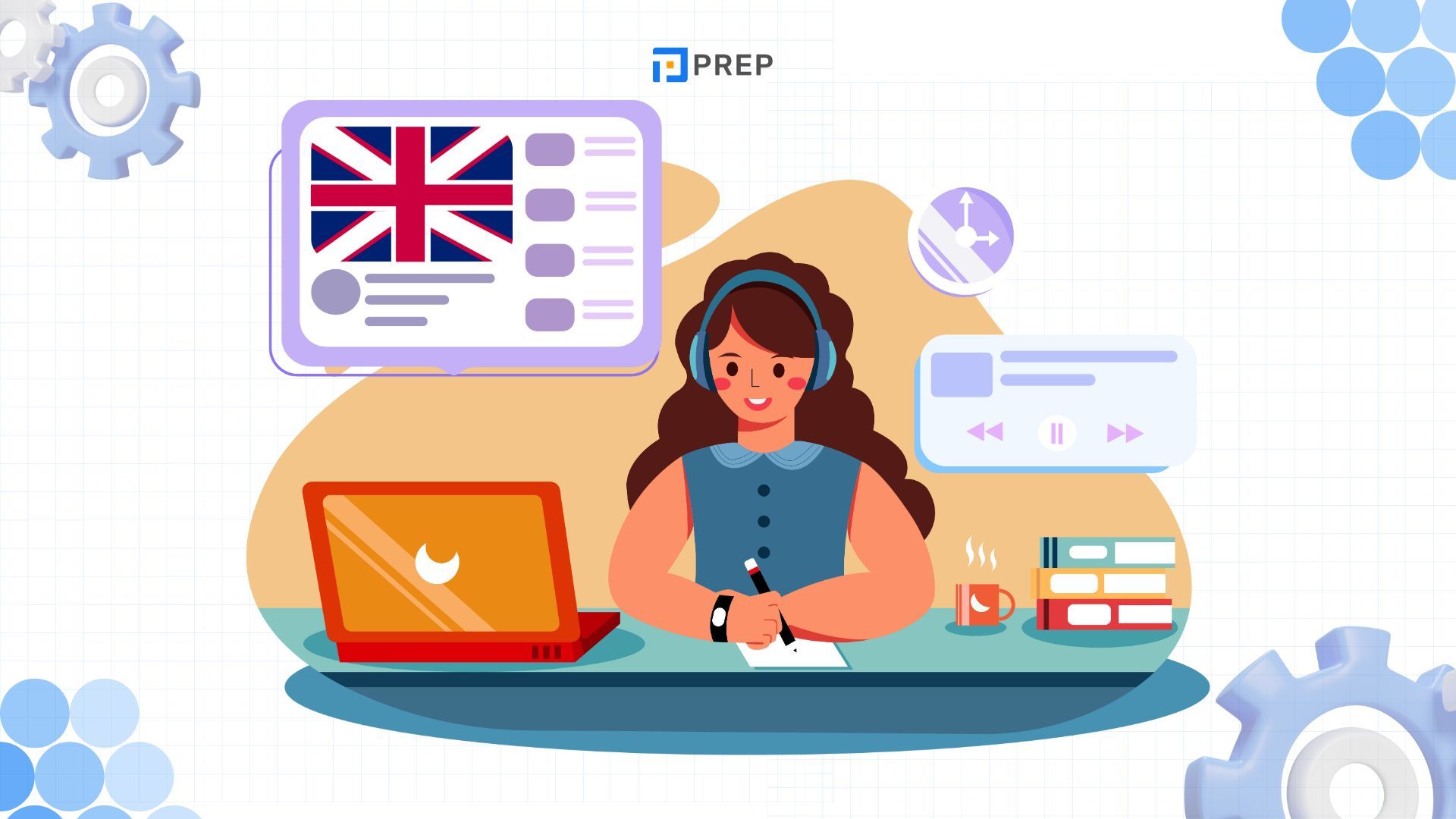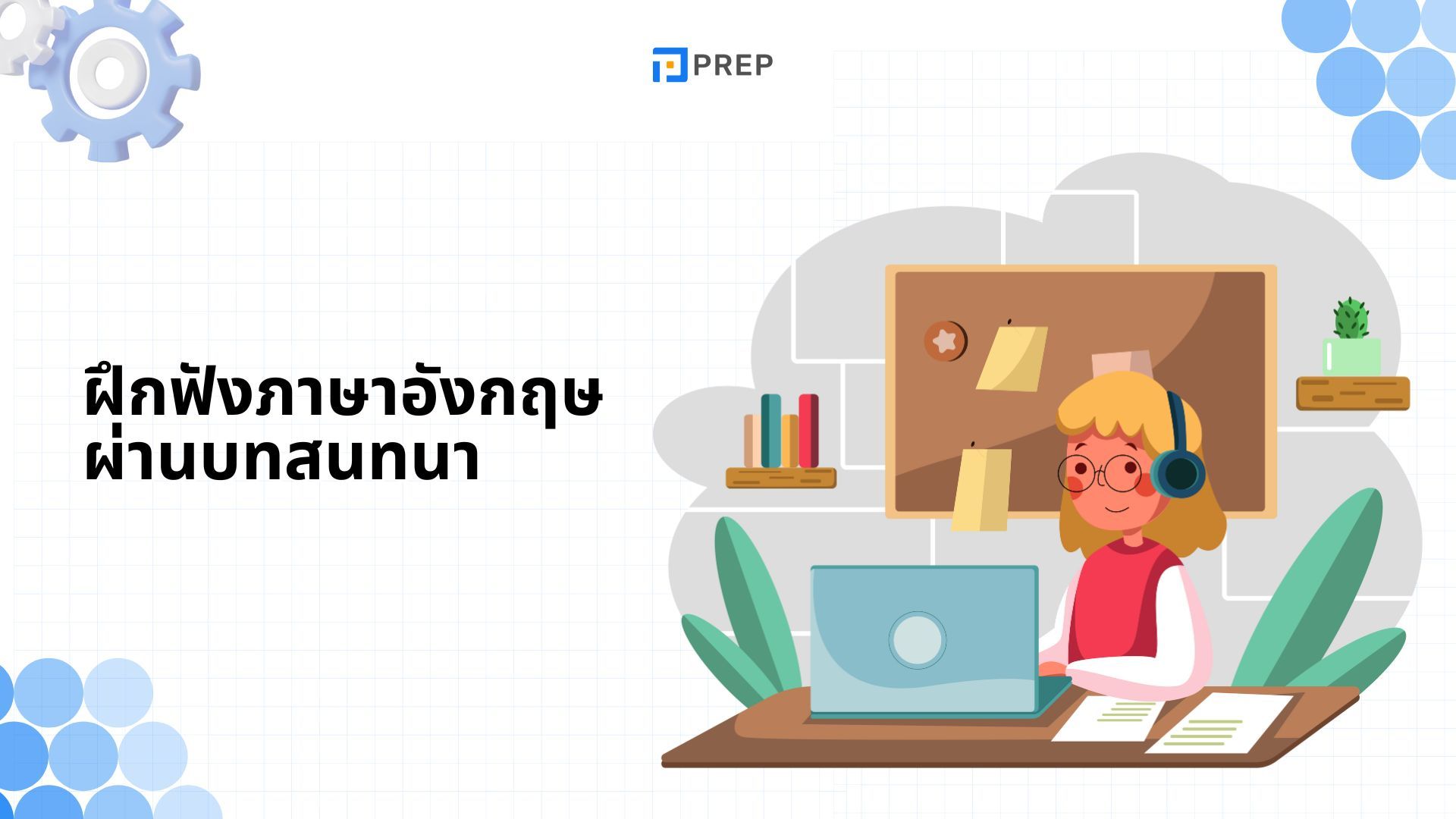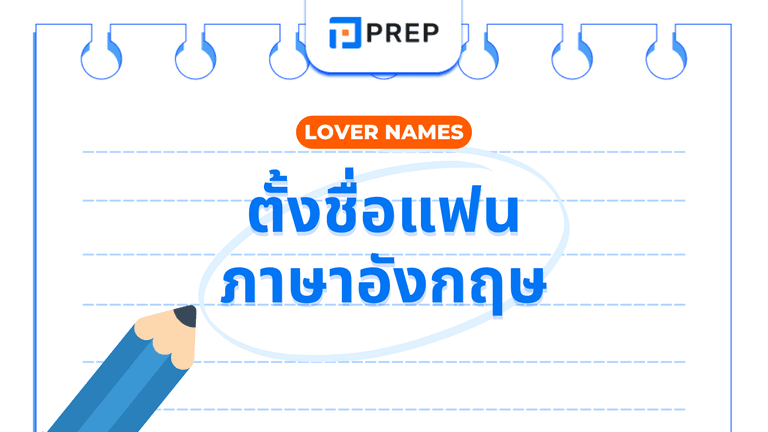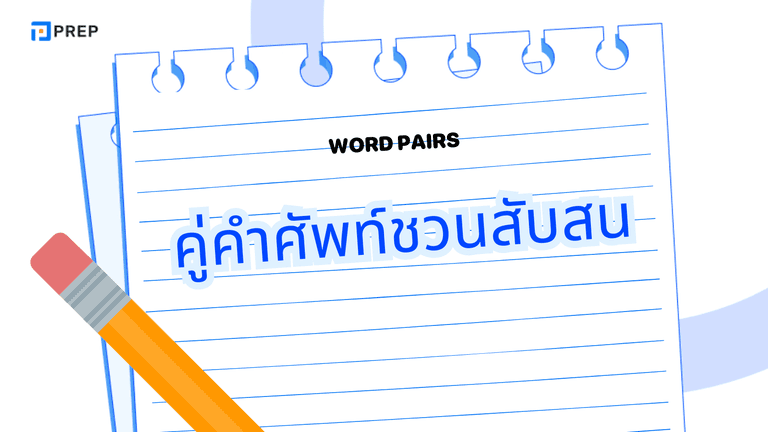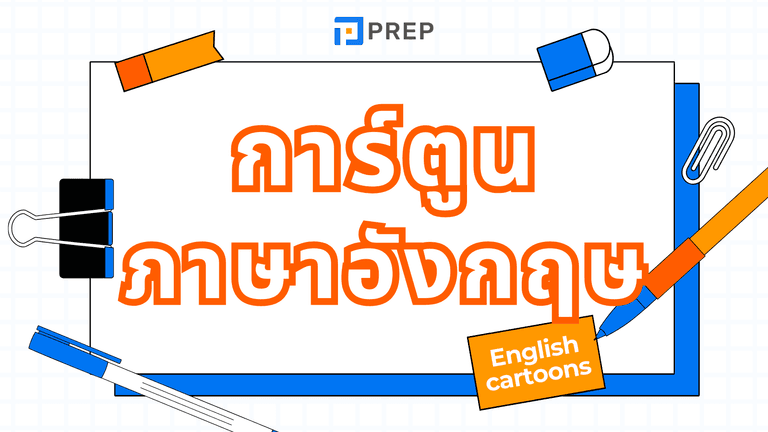การสื่อสารภาษาอังกฤษอย่างมีประสิทธิภาพคือเป้าหมายที่ผู้เรียนภาษาอังกฤษส่วนใหญ่ตั้งใจไว้ ด้านล่างนี้คือบทสนทนาภาษาอังกฤษ 10 หัวข้อทั่วไปพร้อมไฟล์เสียงที่มีเจ้าของภาษาพูดเพื่อช่วยคุณฝึกฟังภาษาอังกฤษผ่านบทสนทนาได้อย่างมีประสิทธิภาพ มาดูกันเลยด้วย PREP ทันที!
ฝึกฟังภาษาอังกฤษผ่านบทสนทนาในหัวข้อทั่วไป 10 หัวข้อ
I. การรวบรวมบทสนทนา 10 หัวข้อทั่วไป ด้านล่างนี้คือสคริปต์ภาษาอังกฤษพร้อมลิงก์ไฟล์เสียงที่แนบมา มาฝึกฟังภาษาอังกฤษผ่านบทสนทนากันเลย!
บทสนทนา 10 หัวข้อทั่วไป
1. หัวข้อ: นิสัยและงานอดิเรก
Link audio:
Mom: Wake up, it’s time for school.
Jake: I’m so tired. Let me sleep for five more minutes.
Mom: You have to get up and get ready for school.
Jake: I know, but just five more minutes.
Mom: I can’t let you go back to sleep, because you won’t wake back up.
Jake: I promise I’ll wake up, in five minutes.
Mom: You still need to eat breakfast, take a shower, and get dressed.
Jake: I realize that, and I can do all that when I wake up in five minutes.
Mom: I don’t want you to be late for school today.
Jake: I’m not going to be late today.
Mom: Fine, five more minutes.
Jake: Thank you.
แม่: ตื่นเถอะ ถึงเวลาไปโรงเรียนแล้ว
Jake: ลูกเหนื่อยมากครับ ให้ลูกนอนอีกห้านาทีครับ
แม่: ต้องตื่นและเตรียมตัวไปโรงเรียนแล้ว
Jake: ลูกรู้ครับ แต่ขออีกห้านาทีเท่านั้นครับ
แม่: ฉันไม่สามารถปล่อยให้เธอกลับไปนอนได้ เพราะเธอจะไม่ตื่นขึ้นมาอีก
Jake: ลูกสัญญาว่าลูกจะตื่น ในห้านาทีครับ
แม่: เธอยังต้องกินอาหารเช้า อาบน้ำ และแต่งตัวอีก
Jake: ลูกรู้ตัวนั้น และลูกสามารถทำทุกอย่างได้เมื่อลูกตื่นขึ้นในห้านาทีครับ
แม่: ฉันไม่อยากให้เธอมาสายที่โรงเรียนวันนี้
Jake: ลูกจะไม่มาสายวันนี้หรอกครับ
แม่: โอเค อีกห้านาที
Jake: ขอบคุณครับแม่
บทความแนะนำอ่านต่อ:
2. หัวข้อ: ข่าวสาร
Link audio:
Amy: Did you hear the news?
Kate: What happened?
Amy: Our cousin went into labor and had her baby last week.
Kate: She did? Why didn’t anyone tell me?
Amy: I would’ve thought that somebody would have told you.
Kate: No, I had no idea.
Amy: Well, she did, her baby was 8 pounds 6 ounces.
Kate: Oh my God, that’s great!
Amy: Are you going to go and visit her and the baby?
Kate: I think that I might.
Amy: Good! I just thought I’d let you know.
Kate: Thanks for telling me.
Amy: เธอได้ยินข่าวรึยัง
Kate: เกิดอะไรขึ้น
Amy: ลูกพี่ลูกน้องของเราเริ่มคลอดและได้ลูกสัปดาห์ที่แล้ว
Kate: เขาคลอดแล้วเหรอ ทำไมไม่มีใครบอกเราเลย
Amy: เราคิดว่าคงมีคนบอกเธอแล้ว
Kate: ไม่นะ เราไม่รู้เลย
Amy: ใช่ เขาคลอดแล้ว ลูกหนัก 8 ปอนด์ 6 ออนซ์
Kate: ดีมากก!
Amy: เธอจะไปเยี่ยมเขาและเด็กไหม
Kate: เราคิดว่าเราอาจจะไป
Amy: ดีมาก! เราแค่คิดว่าเราควรแจ้งให้เธอทราบ
Kate: ขอบคุณที่บอกเรานะ
3. หัวข้อ: การเดินทาง
Link audio:
Mike: Excuse me. Could you tell me where the library is?
Ariel: Yes, it’s that way. You go three blocks to Washington Street, then turn right. It’s on the corner, across from the bank.
Mike: Thanks! I’ve only been in town a few days, so I really don’t know my way around yet.
Jade: Oh, I know how you feel. We moved here a year ago, and I still don’t know where everything is!
Mike: ขอโทษครับ คุณบอกผมได้ไหมว่าห้องสมุดอยู่ที่ไหนครับ
Ariel: ใช่ค่ะ อยู่ทางนั้นค่ะ คุณเดินไปสามช่วงตึกถึงถนนวอชิงตัน แล้วเลี้ยวขวาค่ะ มันอยู่ที่มุมตรงข้ามกับธนาคาร
Mike: ขอบคุณครับ! ผมอยู่ในเมืองนี้ได้แค่ไม่กี่วันเอง ก็ยังไม่ค่อยรู้ทางเท่าไหร่นัก
Jade: โอ้ ฉันเข้าใจคุณดีค่ะ เราย้ายมาที่นี่เมื่อปีที่แล้ว และฉันยังไม่รู้เลยว่าทุกอย่างอยู่ที่ไหนบ้าง!
บทความแนะนำอ่านต่อ:
4. หัวข้อ: อาหารและเครื่องดื่ม
Link audio:
Waiter: May I get you anything to drink?
Guest: Yes, please. May I get a glass of lemonade?
Waiter: Would you like an appetizer?
Guest: May I get an order of barbeque wings?
Waiter: Sure, would you like anything else?
Guest: That’ll be fine for now, thank you.
Waiter: Tell me when you want to order the rest of your food.
Guest: Excuse me. I’m ready to order.
Waiter: What would you like?
Guest: Let me have the baby-back ribs.
Waiter: Sure, will there be anything else that I can get you?
Guest: That will be it for now.
พนักงานเสิร์ฟ: คุณต้องการดื่มอะไรไหมครับ
แขก: ใช่ค่ะ ขอน้ำมะนาวหนึ่งแก้วได้ไหมคะ
พนักงานเสิร์ฟ: คุณต้องการอาหารว่างไหมครับ
แขก: ขอสั่งปีกไก่บาร์บีคิวหนึ่งออเดอร์ได้ไหมคะ
พนักงานเสิร์ฟ: ได้ครับ คุณต้องการอะไรเพิ่มเติมไหมครับ
แขก: นั่นก็พอแล้วค่ะ ขอบคุณค่ะ
พนักงานเสิร์ฟ: บอกผมเมื่อคุณพร้อมสั่งอาหารจานหลักนะครับ
แขก: ขอโทษค่ะ ฉันพร้อมสั่งแล้วค่ะ
พนักงานเสิร์ฟ: คุณต้องการอะไรครับ
แขก: ขอซี่โครงหมูนุ่มค่ะ
พนักงานเสิร์ฟ: ได้ครับ มีอะไรที่ผมสามารถนำมาให้คุณได้อีกไหมครับ?
แขก: นั่นก็พอแล้วค่ะ
5. หัวข้อ: งานและการศึกษา
Link audio:
A: I am not certain, but I think I might ask to be considered for the new job.
B: Why are you considering trying for it?
A: I think that I might like it, but I am still thinking about it.
B: What is it about this job that appeals to you?
A: I think that I would enjoy the position but there isn’t a lot of creativity involved.
B: Yes, you could be right. There is a lot to consider.
A: I am also wondering about the pay.
B: Would a slight decrease in pay be worth it for a new opportunity for growth?
A: I am thinking that might be the case.
B: I think you should give it a shot. What do you have to lose? You can always change your mind.
A: ฉันยังไม่แน่ใจ แต่ฉันคิดว่าอาจจะขอพิจารณาให้ลองงานใหม่ค่ะ
B: ทำไมถึงคิดจะลองสมัครดูคะ
A: ฉันคิดว่าฉันอาจจะชอบมัน แต่ฉันยังคิดอยู่ค่ะ
B: งานนี้มีอะไรถูกใจคุณบ้างคะ
A: ฉันคิดว่าฉันอาจจะสนุกกับตำแหน่งนี้ แต่มันไม่ค่อยมีส่วนที่ต้องใช้ความคิดสร้างสรรค์
B: ใช่ คุณอาจจะถูกต้อง มีหลายอย่างที่ต้องพิจารณาค่ะ
A: ฉันก็กำลังสงสัยเกี่ยวกับเรื่องค่าตอบแทนด้วยค่ะ
B: การลดค่าตอบแทนเล็กน้อยจะคุ้มค่ากับโอกาสใหม่ในการเติบโตไหมคะ
A: ฉันคิดว่าอาจจะเป็นอย่างนั้นค่ะ
B: ฉันคิดว่าคุณควรลองดู คุณจะเสียอะไรไปคะ คุณสามารถเปลี่ยนใจได้ตลอดเวลา
6. หัวข้อ: ครอบครัวและเพื่อนฝูง
Link audio:
A: There’s a new girl in school, have you seen her yet?
B: I haven’t seen her yet.
A: I think that she is very pretty.
B: Tell me how she looks.
A: She’s kind of short.
B: What height is she?
A: She’s probably about five feet.
B: That’s nice, but tell me what she looks like.
A: The first thing I noticed was her beautiful brown eyes.
B: I think I might’ve bumped into her before.
A: Are you telling me that you’ve seen her before?
B: I believe so.
A: มีเด็กใหม่ที่โรงเรียน แกเห็นเขาแล้วหรือยัง
B: ฉันยังไม่เคยเห็นเขาเลย
A: ฉันคิดว่าเขาสวยมาก
B: บอกฉันสิว่าเขาหน้าตาเป็นยังไง
A: เธอค่อนข้างเตี้ยนะ
B: เธอสูงเท่าไหร่?
A: น่าจะประมาณห้าฟุต
B: นั่นดีนะ แต่บอกฉันสิว่าเขาหน้าตาเป็นยังไง
A: สิ่งแรกที่ฉันสังเกตเห็นคือดวงตาสีน้ำตาลสวยของเขา
B: ฉันคิดว่าฉันอาจจะเคยเจอเขามาก่อน
A: แกกำลังบอกฉันว่าแกเคยเห็นเขามาก่อนเหรอ
B: ฉันเชื่อว่าเป็นอย่างนั้น
7. หัวข้อ: บันเทิง
Link audio:
A: How often do you read books?
B: I read books almost every night before I go to bed.
A: What’s your favorite type of book?
B: I love reading about different cultures.
A: What can you learn from books?
B: Books can broaden my horizon about thousands of things around the world, and books are also my best friends.
A: Where do you read books?
B: I read books at home, sometimes in the library.
A: What’s the most interesting book you have ever read?
B: I think that would be Nepal, a book written about the country of Nepal, published in 1999.
A: How long does it take you to finish a book?
B: Well, it depends on the length of the book, but it usually takes me a week to finish a 300-page book.
A: Do you usually bring books with you when you travel?
B: Yes, I do. When I’m at the airport or bus station, I read books to kill time.
A: Is there any bookstore or library in your area?
B: Unfortunately, there are none near my house. The nearest one is 3 kilometers away.
A: คุณอ่านหนังสือบ่อยแค่ไหนคะ
B: ฉันอ่านหนังสือเกือบทุกคืนก่อนนอน
A: ประเภทหนังสือที่คุณชอบคืออะไรคะ
B: ฉันชอบอ่านเกี่ยวกับวัฒนธรรมต่างๆ
A: คุณเรียนรู้อะไรจากหนังสือได้บ้างคะ
B: หนังสือช่วยขยายขอบเขตความคิดของฉันเกี่ยวกับสิ่งต่างๆ ทั่วโลก และหนังสือยังเป็นเพื่อนที่ดีที่สุดของฉันด้วย
A: คุณอ่านหนังสือที่ไหนคะ
B: ฉันอ่านหนังสือที่บ้าน บางครั้งก็ในห้องสมุด
A: หนังสือเล่มไหนที่น่าสนใจที่สุดที่คุณเคยอ่านคะ
B: ฉันคิดว่าน่าจะเป็นเนปาล หนังสือที่เขียนเกี่ยวกับประเทศเนปาล ตีพิมพ์ในปี 1999
A: คุณใช้เวลานานแค่ไหนในการอ่านหนังสือเล่มหนึ่งจบคะ
B: ก็ขึ้นอยู่กับความยาวของหนังสือ แต่โดยปกติจะใช้เวลาประมาณหนึ่งสัปดาห์ในการอ่านหนังสือ 300 หน้า
A: คุณมักจะพกหนังสือติดตัวเวลาเดินทางไหมคะ
B: ใช่ ฉันทำ ตอนที่ฉันอยู่ที่สนามบินหรือที่ป้ายรถบัส ฉันอ่านหนังสือเพื่อฆ่าเวลา
A: มีร้านหนังสือหรือห้องสมุดใกล้กับที่คุณอยู่มั้ยคะ
B: น่าเสียดาย ไม่มีใกล้บ้านฉันเลย ที่ใกล้ที่สุดอยู่ห่างไป 3 กิโลเมตร
8. หัวข้อ: สุขภาพ
Link audio:
A: What sport do you like?
B: I like playing badminton.
A: Is it easy to play that sport?
B: Yes, it’s pretty easy to play.
A: Is that sport popular in your country?
B: Yes, it is.
A: How long have you been practicing that sport?
B: I have been practicing it for 5 years.
A: Who do you play sports with?
B: I play badminton with my friends, sometimes with my brother.
A: How often do you play that sport?
B: I play badminton every weekend.
A: What benefits can you get from that sport?
B: It helps strengthen my muscles because while playing, I have to move continuously. It is good to burn calories as well.
A: Do you like watching football? Online or offline?
B: Yes, I do. I prefer watching football offline and online. Going to the stadium, shouting and cheering are good to release stress.
A: What is your favorite football team?
B: I like the Manchester United Football Club, also known as “The Red Devils”.
A: Why is sport important?
B: Sports are sources of recreation. People can learn how to encourage team spirit when they play sports, too.
A: คุณชอบกีฬาอะไรครับ
B: ผมชอบเล่นแบดมินตันครับ
A: เล่นกีฬานี้ง่ายไหมครับ
B: ใช่ มันค่อนข้างง่ายที่จะเล่นครับ
A: กีฬานี้นิยมในประเทศคุณไหมครับ
B: ใช่ นิยมครับ
A: คุณฝึกซ้อมกีฬานี้มานานแค่ไหนแล้วครับ
B: ผมฝึกซ้อมมา 5 ปีแล้วครับ
A: คุณเล่นกีฬากับใครครับ
B: ผมเล่นแบดมินตันกับเพื่อน บางครั้งกับพี่ชายครับ
A: คุณเล่นกีฬานี้บ่อยแค่ไหนครับ
B: ผมเล่นแบดมินตันทุกสุดสัปดาห์ครับ
A: คุณได้ประโยชน์อะไรจากกีฬานี้บ้างครับ
B: มันช่วยเสริมสร้างกล้ามเนื้อเพราะต้องเคลื่อนไหวต่อเนื่องขณะเล่น มันยังช่วยเผาผลาญแคลอรี่ได้ดีด้วย
A: คุณชอบดูฟุตบอลไหมครับ ออนไลน์หรือออฟไลน์ครับ
B: ชอบครับ ผมชอบดูฟุตบอลทั้งออนไลน์และออฟไลน์ การไปสนาม ตะโกนและเชียร์ช่วยลดความเครียดได้
A: ทีมฟุตบอลที่คุณชอบคือทีมไหนครับ
B: ผมชอบสโมสรฟุตบอลแมนเชสเตอร์ยูไนเต็ด หรือที่รู้จักกันว่า "ปีศาจแดง"
A: ทำไมกีฬาถึงสำคัญครับ
B: กีฬาเป็นแหล่งของการพักผ่อนหย่อนใจ ผู้คนยังสามารถเรียนรู้การส่งเสริมจิตวิญญาณของทีมเมื่อเล่นกีฬาด้วยครับ
บทความแนะนำอ่านต่อ:
9. หัวข้อ: วันหยุด
Link audio:
A: How many popular festivals are there in your country?
B: There are many: New Year’s day, Martin Luther King day, Valentine’s day, St. Patrick day, Easter, etc.
A: What is the most important festival in your country?
B: I believe that New Year’s day is the most important one since it’s a chance for family reunions and parties. People gather together to welcome the new year.
A: When does it take place?
B: It occurs on January 1st.
A: Where’s the festival celebrated?
B: B: The New Year’s day is celebrated all over the country. Each family has its own way to celebrate the day.
A: What do people do to prepare for the festival?
B: Before New Year’ day, people go shopping for food and drinks, repair the house or put up decor.
A: Who can join the festival?
B: It’s a day for everybody.
A: What do people do in the festival?
B: On New Year’ Eve, people have a party with traditional food and drinks. After that, they may visit friends or relatives, go to the movies or watch sports.
A: What’s special about that festival?
B: It marks the end of a year and celebrates a new year. People believe that the things they do on the first day will bring good luck and prosperity to them during the whole year.
A: Is the festival culturally related?
B: Sure, the festival is an integral part of culture.
A: Why is a festival important?
B: It adds structure to our social lives and connects us with our families and backgrounds.
A: มีเทศกาลที่นิยมในประเทศของคุณกี่เทศกาลคะ
B: มีหลายเทศกาลค่ะ: วันปีใหม่ วันมาร์ติน ลูเทอร์ คิง วันวาเลนไทน์ วันเซนต์แพทริค วันอีสเตอร์ ฯลฯ ค่ะ
A: เทศกาลไหนที่สำคัญที่สุดในประเทศของคุณคะ
B: ฉันเชื่อว่าวันปีใหม่เป็นเทศกาลที่สำคัญที่สุด เนื่องจากเป็นโอกาสสำหรับการรวมตัวของครอบครัวและจัดงานเลี้ยง ผู้คนมารวมตัวกันเพื่อต้อนรับปีใหม่ค่ะ
A: เทศกาลนี้จัดขึ้นเมื่อไรคะ
B: มันจัดขึ้นในวันที่ 1 มกราคมค่ะ
A: เทศกาลนี้จัดที่ไหนคะ
B: วันปีใหม่ถูกฉลองทั่วประเทศ แต่ละครอบครัวมีวิธีฉลองที่แตกต่างกันค่ะ
A: ผู้คนทำอะไรเพื่อเตรียมตัวสำหรับเทศกาลนี้คะ
B: ก่อนวันปีใหม่ ผู้คนจะไปซื้อของกินและเครื่องดื่ม ซ่อมแซมบ้านหรือตกแต่งบ้านค่ะ
A: ใครสามารถเข้าร่วมเทศกาลนี้ได้บ้างคะ
B: มันเป็นวันที่ทุกคนสามารถเข้าร่วมได้ค่ะ
A: ผู้คนทำอะไรในเทศกาลคะ
B: ในคืนวันสิ้นปี ผู้คนจะจัดงานเลี้ยงพร้อมอาหารและเครื่องดื่มแบบดั้งเดิม หลังจากนั้นพวกเขาอาจไปเยี่ยมเพื่อนหรือญาติ ไปดูหนังหรือดูกีฬาค่ะ
A: มีอะไรพิเศษเกี่ยวกับเทศกาลนี้บ้างคะ
B: เทศกาลนี้ทำให้เรารู้สึกถึงการสิ้นสุดของปีหนึ่งและการเฉลิมฉลองปีใหม่ ผู้คนเชื่อว่าสิ่งที่พวกเขาทำในวันแรกจะนำโชคดีและความมั่งคั่งมาให้พวกเขาตลอดทั้งปีค่ะ
A: เทศกาลนี้เกี่ยวข้องกับวัฒนธรรมไหมคะ
B: แน่นอน เทศกาลนี้เป็นส่วนหนึ่งของวัฒนธรรมที่ไม่แยกจากกันค่ะ
A: ทำไมเทศกาลถึงสำคัญคะ
B: เทศกาลช่วยเพิ่มโครงสร้างให้กับชีวิตทางสังคมของเราและเชื่อมโยงเรากับครอบครัวและพื้นหลังของเราค่ะ
10. หัวข้อ: สิ่งแวดล้อม
Link audio:
A: How many kinds of pollution are there?
B: There are many types of pollution: land, water, noise, air, light, and thermal pollution.
A: What type of pollution is popular in your country?
B: The most popular one is water pollution, I guess.
A: Have you ever littered?
B: Yes, I have, but when I was taught the lesson of protecting Mother Nature, I quit littering.
A: What can you do to help prevent pollution?
B: Reduce and reuse whatever I can to eliminate the amount of waste is what I can do to prevent pollution.
A: What does the government do to encourage people to protect the environment?
B: They organize some campaigns to raise the awareness of people. Everything should start from education.
A: Are people in your country aware of the environmental issues?
B: Yes, they are. They care about what happens to the environment around them.
A: Is there any law to force people to protect the environment?
B: Yes. The environment law states punishments to people doing harm to the environment.
A: มีประเภทของมลพิษกี่ประเภทคะ
B: มีมลพิษหลายประเภท: ที่ดิน, น้ำ, เสียง, อากาศ, แสง และความร้อนครับ
A: ประเภทของมลพิษที่พบบ่อยในประเทศของคุณคืออะไรคะ
B: น่าจะเป็นมลพิษน้ำนะครับ
A: คุณเคยทิ้งขยะลงพื้นไหมคะ
B: ใช่ ฉันเคยทิ้ง แต่เมื่อฉันได้รับการสอนเกี่ยวกับการปกป้องธรรมชาติแม่ ฉันก็เลิกทิ้งขยะครับ
A: คุณทำอะไรได้บ้างเพื่อช่วยป้องกันมลพิษคะ
B: ลดและใช้ซ้ำสิ่งที่ฉันทำได้เพื่อลดปริมาณขยะคือสิ่งที่ฉันทำได้เพื่อป้องกันมลพิษครับ
A: รัฐบาลทำอะไรเพื่อสนับสนุนให้ผู้คนปกป้องสิ่งแวดล้อมคะ
B: พวกเขาจัดแคมเปญบางอย่างเพื่อเพิ่มความตระหนักรู้ให้กับผู้คน ทุกอย่างควรเริ่มจากการศึกษาครับ
A: ผู้คนในประเทศของคุณตระหนักถึงปัญหาสิ่งแวดล้อมไหมคะ
B: ใช่ พวกเขาใส่ใจกับสิ่งที่เกิดขึ้นกับสิ่งแวดล้อมรอบตัวครับ
A: มีกฎหมายใดที่บังคับให้ผู้คนปกป้องสิ่งแวดล้อมไหมคะ
B: ใช่ครับ กฎหมายสิ่งแวดล้อมระบุโทษสำหรับผู้ที่ทำลายสิ่งแวดล้อมครับ
บทความแนะนำอ่านต่อ:
II. ขั้นตอนที่ได้ผลในการฝึกฟังภาษาอังกฤษผ่านบทสนทนา การฝึกฟังภาษาอังกฤษผ่านบทสนทนาเป็นวิธีที่จะช่วยพัฒนาทักษะภาษาของคุณ ต่อไปนี้คือขั้นตอนที่คุณสามารถดำเนินการได้เพื่อใช้ประโยชน์จากบทสนทนาได้อย่างมีประสิทธิภาพ:
เลือกบทสนทนาที่เหมาะสม: เลือกบทสนทนาที่สะท้อนถึงสถานการณ์การสื่อสารในชีวิตจริงที่คุณพบเจอทุกวัน สิ่งนี้ช่วยให้คุณเรียนรู้คำศัพท์และโครงสร้างไวยากรณ์ที่เกี่ยวข้องกับบริบทนั้นๆ
ฟังโดยไม่ดูข้อความ: ฟังบทสนทนาภาษาอังกฤษโดยไม่ดูข้อความ พยายามเข้าใจเนื้อหาโดยทั่วไปและการแสดงออกของผู้พูด สิ่งนี้ช่วยให้คุณพัฒนาทักษะการฟังผ่านบริบทและน้ำเสียง
ฟังซ้ำหลายครั้ง: ฟังบทสนทนาภาษาอังกฤษหลายครั้งเพื่อคุ้นเคยกับคำศัพท์ โครงสร้างประโยค และน้ำเสียงของผู้พูด สิ่งนี้ช่วยเสริมสร้างความรู้และปรับปรุงทักษะการฟังของคุณเมื่อเวลาผ่านไป
จดบันทึกคำศัพท์และโครงสร้างไวยากรณ์ใหม่: จดบันทึกคำศัพท์และโครงสร้างไวยากรณ์ใหม่ที่คุณได้ยินในบทสนทนาภาษาอังกฤษ จากนั้นค้นคว้าหาความหมายและการใช้งาน
ทำแบบฝึกหัดฟัง: หาแบบฝึกหัดฟังออนไลน์หรือใช้แอพพลิเคชั่นมือถือในการทำแบบฝึกหัดฟังตามบทสนทนาที่คุณได้ฟังมา สิ่งนี้ช่วยให้คุณทดสอบและปรับปรุงทักษะการฟังของคุณ
ฝึกฟังภาษาอังกฤษทุกวัน: อย่าลืมฝึกฟังภาษาอังกฤษผ่านบทสนทนาทุกวัน ยิ่งคุณฝึกอย่างต่อเนื่อง ทักษะการฟังของคุณก็จะดีขึ้นเท่านั้น
ฝึกฟังภาษาอังกฤษผ่านบทสนทนา
อย่าลืมฝึกฟังภาษาอังกฤษผ่านบทสนทนาอย่างมีประสิทธิภาพด้วยการบันทึกเสียง 10 ชิ้นที่ PREP ให้มาด้านบนนี้ ขอให้คุณสื่อสารได้เป็นอย่างดี
เรียน IELTS Reading & Listening ที่ PREP สบายๆ แต่ได้ผลจริง! คอร์สนี้เหมาะสำหรับทุกคนที่กำลัง เตรียมสอบ IELTS เพราะคุณจะได้ฝึกทักษะที่จำเป็นสำหรับทุกประเภทคำถาม ไม่ว่าจะง่ายหรือยาก เรามีกลยุทธ์เจาะลึกตั้งแต่ระดับพื้นฐานจนถึงระดับสูง
พิเศษกว่าใคร! ด้วยห้องฝึกสอบ IELTS 3D Prep AI เตรียมสอบ IELTS
การเรียนรู้แบบจัดเต็มนี้จะช่วยให้คุณไม่รู้สึกเบื่อหรือท้อ และยังทำให้พัฒนาความสามารถได้เร็วยิ่งขึ้น
ดาวน์โหลดแอป PREP เลย! เรียน IELTS ออนไลน์ที่บ้าน ได้ทุกที่ ทุกเวลา
ติดต่อ HOTLINE +6624606789 หรือคลิก ที่นี่ เพื่อสมัครเลย!

